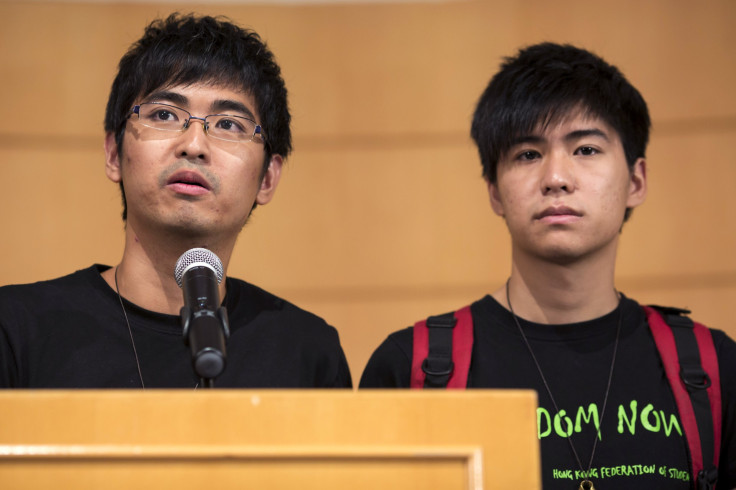Hong Kong Update: Students Dissatisfied With Results From Government Negotiations, Plan To Continue Occupying

Hong Kong officials met with student protest leaders Tuesday to negotiate democratic reforms and to bring an end to three weeks of protests in the city, but nothing was formally agreed upon in the first day of meetings. Student leader Alex Chow called the government proposals “kind of vague,” and answered only one question put forth by a Cantonese-speaking reporter in a press conference following the meeting.
“(Officials) in the Hong Kong government can now decide whether to be democratic heroes or historical villains,” Chow said. “I believe every Hong Kong citizen is waiting to see.” The five student leaders who met with government representatives wore shirts reading “Freedom Now!” and wore necklaces with yellow umbrella and yellow ribbon pendants, both symbols of the movement.
Alex Chow: No concrete proposals from gov, don't know details of how platform formed, how report written. All vague. pic.twitter.com/JD0jT7CM6k
- Occupy Central 和平佔中 (@OCLPHK) October 21, 2014The talks were broadcast live, and thousands of protesters gathered in their Admiralty district base of operations to watch on large screens. The crowd broke into applause when their leaders criticized government negotiators. Protesters in Mong Kok, where they’ve clashed with anti-Occupy Hong Kongers, gathered to discuss the results of the talks.
The five student representatives were greeted by “thunderous cheering” as they took the stage back at Admiralty following the talks on Tuesday night, according to the South China Morning Post’s “Young Post” outlet. Each of the five representatives of the Hong Kong Federation of Students who took part in the negotiations criticized the government representatives for ignoring people’s opinions.
Lester Shum: Carrie Lam slapped #HK ppl in the face when she said NPCSC decision wasn't a blow to democracy in HK. Gov took us for 2 hr walk
- Occupy Central 和平佔中 (@OCLPHK) October 21, 2014Hkfs Lester Shum: you think sleeping on the streets is fun, Carrie Lam? You should come try it #occupycentral #umbrellamovement
- Young Post (@youngposthk) October 21, 2014Hkfs Yvonne Leung: the gov's points made no sense. They should come here and tell the ppl and see if anyone understands #occupycentral
- Young Post (@youngposthk) October 21, 2014Carrie Lam, who heads the government negotiating team, alluded in her post-meeting press conference that there could be a round of public polling or debate over full democracy. Embattled Chief Executive Leung Chun-ying angered some when he suggested that democratic elections would place too much emphasis on “half of the people in Hong Kong who earn less than $1,800 a month,” which would erode business opportunities.
Carrie Lam says it needs public consultation on achieving universal suffrage in #HongKong #LIVE
- CCTVNEWS (@cctvnews) October 21, 2014The People’s Daily, the Communist Party of China’s official newspaper, had little to say on the negotiations. It ran an editorial Tuesday attacking alleged American influence behind the protests and tweeted one message noting the start of negotiations.
Student leaders told supporters they sought to meet with government representatives as soon as possible and the latter said they were willing to meet again, but gave no timetable.
© Copyright IBTimes 2025. All rights reserved.






















